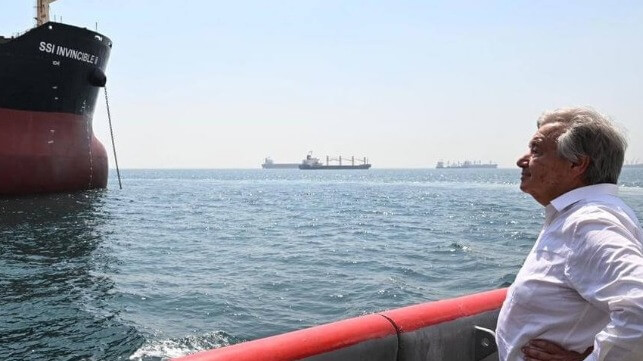UN with Support from EU Pushes for Black Sea Grain Initiative Renewal

The United Nations has built a strong case for the renewal of the Black Sea Grain Initiative and now is enlisting the aid of both its partner in Turkey as well as the European Union in a final push before the agreement expires on July 17. The UN continues to highlight the challenges of food insecurity and spiking global food prices while dangling new financial incentives to get Russia to relent in its repeated statements that it will not support further extensions.
Russia’s foreign ministry is on record stating that it was “obvious there are no grounds” to continue the deal past July 17. They have previously demanded better access for Russian crops and fertilizer. Russia has used these negotiations as a tool to pressure the sanctions saying without access to the global financial system it is impossible to sell its agricultural products.
UN Secretary-General António Guterres is continuing the efforts to broker a new agreement with Russia. The European Union confirmed that it was willing to work with the UN saying would consider new options to aid in extending the grain deal.
A letter was sent to Russian President Vladimir Putin from the UN outlining a number of proposals.
U.N. spokesperson Stephane Dujarric confirmed the existence of the letter sent on Thursday saying the objective is to remove hurdles affecting financial transactions.
According to a report from Reuters, the EU is considering relenting on the sanctions and agreeing to connect a subsidiary of Russia's agricultural bank to the SWIFT international payment system. According to the report, the UN proposed extending the grain deal for several months giving the EU time to move forward.
In its public statement, the UN contends the initiative agreed by Russia, Turkey, and Ukraine has played an “indispensable role” in global food security for almost a year. This is based on the fact that the deal has allowed millions of tonnes of grain and other foodstuffs to leave Ukraine’s ports, with key destinations being developing countries, a majority of which have been grappling with food insecurity.
Over the past year since the agreement was first reached, more than 32 million tonnes of food commodities have been exported from three Ukrainian Black Sea ports to 45 countries across three continents. The impacts have been unblocking vital food commodities and helping reverse spiking global food prices, which had reached record highs before the agreement was signed on July 22, 2022.
Since hitting a peak in March last year following Russia’s invasion of Ukraine, commodity prices have steadily declined by 23 percent, according to the UN Food and Agriculture Organization Food Price Index. The index, which stood at 140.6 in July 2022 when the initiative was unveiled, has declined by 11.6 percent reaching 122.3 points in June 2023. The FAO Cereal Price Index has also fallen by 14 percent from 147.3 points to 126.6 points, thanks in part to increased global supplies facilitated by the agreement.
“The initiative has helped reconnect foodstuffs from Ukraine to global supply chains, contributing to lower prices on world markets,” said the UN in a statement. “The UN would like to see the initiative implemented and extended for as long as is needed so that food can be transported out of Ukraine using the Black Sea route safely and cost-effectively.”
The initiative whose initial duration was for 120 days starting on July 22, 2022, was renewed three times. Despite committing to the extension in May 2023, Russia has blocked one of the Ukrainian ports and slowed inspections during the past two months. The last of the ships has now departed with no more authorized in advance of Monday’s official expiration.
Today, the command of Russia's Black Sea Fleet further complicated the situation by issuing a warning to mariners about the presence of a mine hazard on the shipping route in the northwestern part of the Black Sea. Russian authorities contend Ukrainian sea mines are drifting uncontrollably, endangering the safe navigation of civilian ships.
